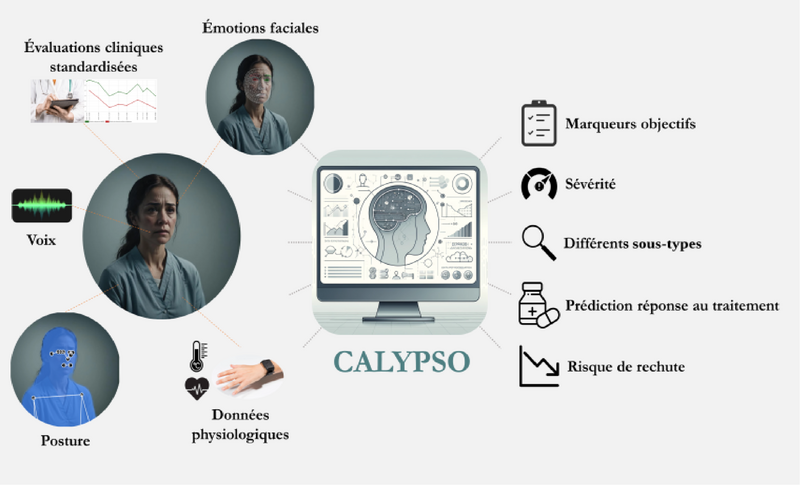CALYPSO project
Clinical and Objective Psychiatric Analyses
The Clinical and objective PSychiatric AnaLYses project (CALYPSO) aims to identify objective clinical markers for psychiatric disorders in order to improve diagnostic accuracy, better predict prognosis and treatment response, and ultimately pave the way for more personalized and effective interventions.
![[Translate to English:] Logotype du CDP CALYPSO](/fileadmin/_processed_/f/f/csm_CrossDisciplinaryProjectLabs_logoCALYPSO-noir_RVB_feba7d0475.png)
In figures
in annual funding from the Initiative of Excellence
Project duration - renewable
The CALYPSO strategy: understanding the project
Prompting the need for precision therapy

CALYPSO's scope of intervention
In figures
Number of people affected by depression worldwide
Proportion of individuals exposed to potentially traumatic events in their lifetime
Prevalence of post-traumatic stress disorder (PTSD) following a traumatic event
Precision therapy
Psychiatric disorders currently affect nearly one in eight people worldwide, making mental health a major public health concern. This situation is being exacerbated by global crises such as the COVID-19 pandemic and climate change, which have intensified conditions such as depression and post-traumatic stress disorder (PTSD).
Although psychiatric research has led to significant progress, the underlying mechanisms of these disorders remain largely unknown, and scientific discoveries often struggle to translate into clinical practice. One of the main challenges lies in the reproducibility of scientific results, which is severely hindered by the heterogeneity of psychiatric disorders—a complexity not yet fully addressed by current classification systems.
We believe that enriching the definition of psychiatric disorders through objective markers—made possible by artificial intelligence and computer vision technologies—could transform the field. By enabling the study of more homogeneous patient groups, these advances could lead to more targeted treatments and improved prognoses, ultimately opening up new pathways for meeting the specific needs of each patient.

CALYPSO methodology
To achieve these goals, the CALYPSO project brings together experts in artificial intelligence, psychiatry, psychology, and neuroscience to build a database of objective markers for depression and post-traumatic mental disorders.
Longitudinal studies conducted with patients suffering from major depression and individuals exposed to potentially traumatic events will enable data collection on three levels:
Subjective clinical symptoms, assessed according to international criteria
Validated assessments of affective and cognitive processes (e.g., emotions, attention)
Objective clinical markers collected using digital tools that integrate computer vision, audio signal analysis, and physiological sensors (heart rate, temperature, etc.), in order to analyze nonverbal behaviors and physiological responses (facial expressions, movement speed, posture, prosody, interactions with connected devices, etc.).
Thanks to advanced data analysis and artificial intelligence, CALYPSO will identify distinct clinical profiles based on these objective markers and analyze their ability to predict the course of disorders over time, resilience, or response to treatment. This work will contribute to a better understanding of psychiatric disorders and lay the groundwork for more tailored prevention strategies and interventions for at-risk or already affected individuals.
At a glance
The CALYPSO project aims to advance the field of mental health by providing valuable insights for society, addressing current limitations in psychiatric diagnosis, and opening new avenues for the prevention and treatment of psychiatric disorders.
![[Translate to English:] Logotype de LilNCog](/fileadmin/_processed_/d/5/csm_cropped-logo-lille-neuroscience-et-cognition_1b766ed18b.png)
![[Translate to English:] Logotype de CRIStAL](/fileadmin/user_upload/initiative-excellence/images/Projets_Recherche/CALYPSO/Cristal_logo.svg)
![[Translate to English:] Logotype du SCALab](/fileadmin/_processed_/6/1/csm_scalab_cb9cb9516c.png)
![[Translate to English:] Logotype du CHU Lille](/fileadmin/_processed_/f/1/csm_Logo_CHU_de_Lille_0634c0216f.png)
![[Translate to English:] Logotype du Cn2r](/fileadmin/_processed_/c/9/csm_Cn2r_logo_24591dddac.png)
![[Translate to English:] Logotype de Demheter](/fileadmin/_processed_/7/f/csm_logo_73cea5d760.png)
![[Translate to English:] Logotype de la Fondation de France](/fileadmin/_processed_/9/2/csm_Fondation_de_France.svg_8fb9228d7e.png)
![[Translate to English:] Logotype de Lille Neuroscience & Cognition](/fileadmin/user_upload/initiative-excellence/images/Projets_Recherche/CALYPSO/cropped-logo-lille-neuroscience-et-cognition.png)
![[Translate to English:] Partenaire [Translate to English:] Accès au site du partenaire : CNRS](/fileadmin/_processed_/0/5/csm_cnrs_56c3662e4f.png)
![[Translate to English:] Partenaire [Translate to English:] Accès au site du partenaire : INRAE](/fileadmin/user_upload/initiative-excellence/images/partenaires/inrae.svg)
![[Translate to English:] Partenaire [Translate to English:] Accés au site du partenaire : CHU](/fileadmin/_processed_/8/7/csm_Logo_CHU_de_Lille_089a7ac546.png)
![[Translate to English:] Partenaire [Translate to English:] Accès au site du partenaire : Centrale Lille](/fileadmin/_processed_/1/3/csm_centrale_lille_e36ec71030.png)